Perhaps it started suddenly, or you noticed it becoming more common over time. Either way, that popping or crackling sound in your ear is becoming more annoying, and possibly worrying.
The causes of these crackling sounds range from fairly common and harmless, to rare and potential signs of more serious disease. Let’s look at the major causes, and what we can do to treat them.
Key Takeaways
- Crackling in your ear can originate from any part of your ear, or around it.
- One defining symptom of Eustachian tube dysfunction is a crackling or popping sound, as pressure builds up in the ears.
- Acute otitis media may be self-limiting, but also features pressure buildup in the middle ear, while Meniere’s disease is more serious and involves increased inner ear pressure.
- Both myoclonus and TMJ disorders involve abnormal muscle contraction.
- Avoiding use of cotton swabs, maintaining good hygiene and immune health, and knowing when to use the Valsalva maneuver can help calm a crackling ear.
What Causes Crackling in the Ears?
There are several main causes of crackling or popping in the ears:
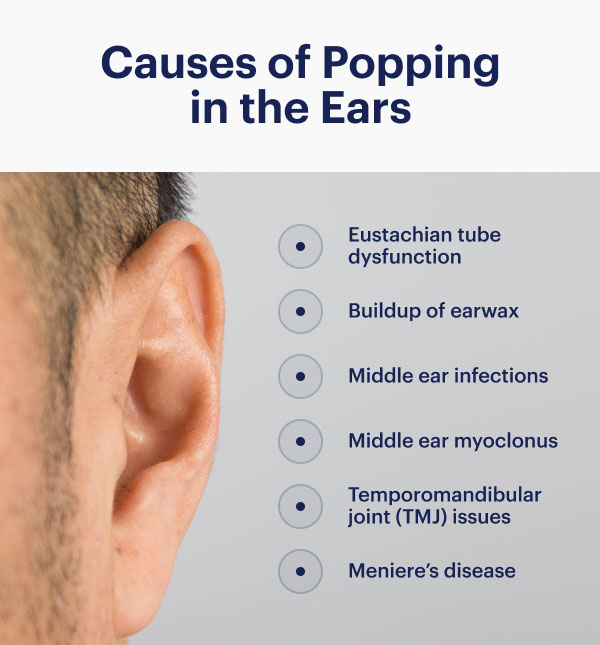
- Eustachian tube dysfunction.
- Buildup of earwax.
- Middle ear infections.
- Middle ear myoclonus.
- Temporomandibular joint (TMJ) issues.
- Meniere’s disease.
Eustachian Tube Dysfunction
Your Eustachian tubes help to equalize pressure in the ears, in terms of air pressure and through draining out fluid and mucus from the ear. A popping or crackling sound is a symptom specific to Eustachian tube dysfunction, alongside a feeling of fullness in the ear. This is typically from an impaired ability to drain fluid.
When your Eustachian tubes have difficulty adjusting to pressure changes, or there is an internal cause of pressure dysregulation, a popping sound is often the result [1].
Buildup of Earwax
A buildup of earwax in the ear canal can be a cause of tinnitus, the perception of sounds with no external source. It typically accompanies ear pain, itchy ears, and even hearing loss. This is more so the case with cerumen impaction. Here, too much earwax causes a physical blockage, such as when using cotton swabs pushes earwax deeper into your ear [2].
Middle Ear Infections
Middle ear infection, or acute otitis media, leads to ear pain and temporary hearing loss too. However, you don’t experience itchiness, and the pain and swelling are much worse. There is generally a rapid onset of other symptoms, triggered by a bacterial or viral infection entering through the outer ear, or from upper respiratory or sinus infections [3].
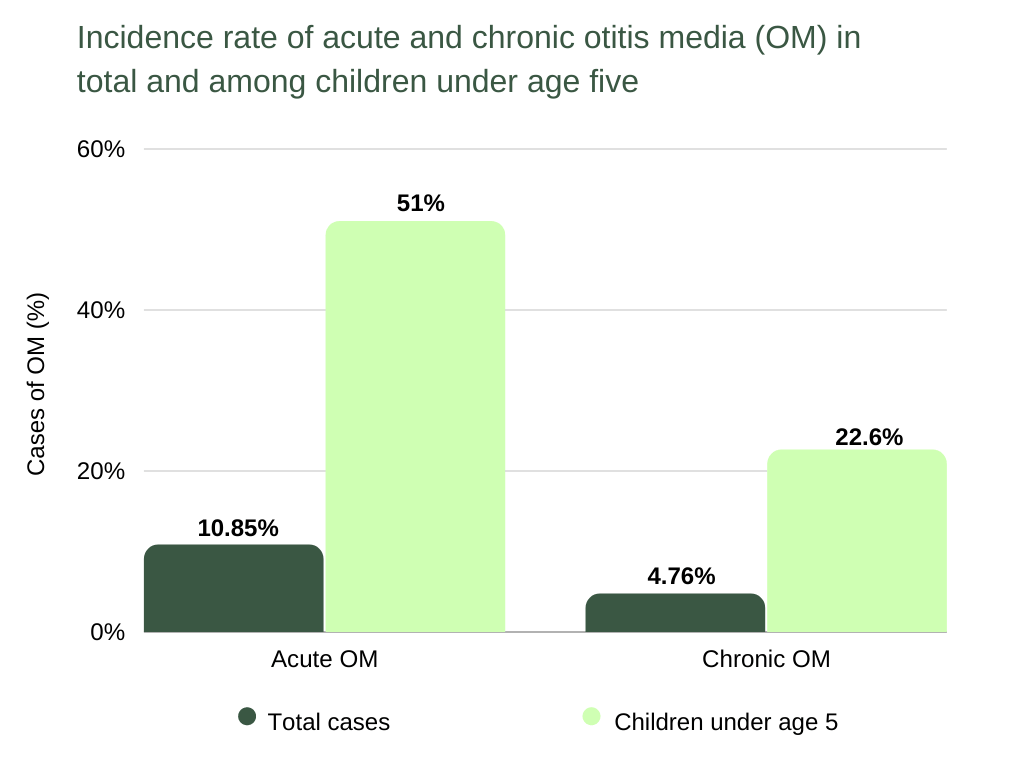
Source: https://www.ncbi.nlm.nih.gov/pmc/articles/PMC3340347/#:~:text=Acute%20OM%20incidence%20rate%20is,occurring%20annually%20in%20under%2Dfives.
Middle Ear Myoclonus
Middle ear myoclonus may involve popping or crackling sounds, or other sounds such as throbbing, whooshing, or fluttering. Sometimes, it is described as “musical ear” syndrome if you have a rhythmic sound, or you subconsciously pair the sound with music.
It features an irregular movement of the middle ear muscles, and can be seen alongside other muscle disorders such as hemifacial spasm or palatal tremor. There may be Eustachian tube or temporomandibular joint (TMJ) disorders behind it, too [4].
Temporomandibular Joint (TMJ) Issues
Temporomandibular joint (TMJ) disorder can involve additional symptoms of pain, stiffness, and tinnitus. Here, muscle spasms in the jaw muscles may dysregulate pressure or produce an unpleasant sound. You may notice that the crackling sound only appears when you are eating or talking, which may be originating from your jaw joint as it moves [5].
Meniere’s Disease
Meniere’s disease is an inner ear disorder where there is excess fluid in the cochlea and the nearby vestibular organ. As the vestibular organ helps to maintain balance, a loss of balance and orientation is a key symptom of the disease. Vertigo and hearing loss are two common Meniere’s disease symptoms.
Meniere’s disease may be autoimmune, or linked with migraine or genetic causes [6].
When To Seek Treatment
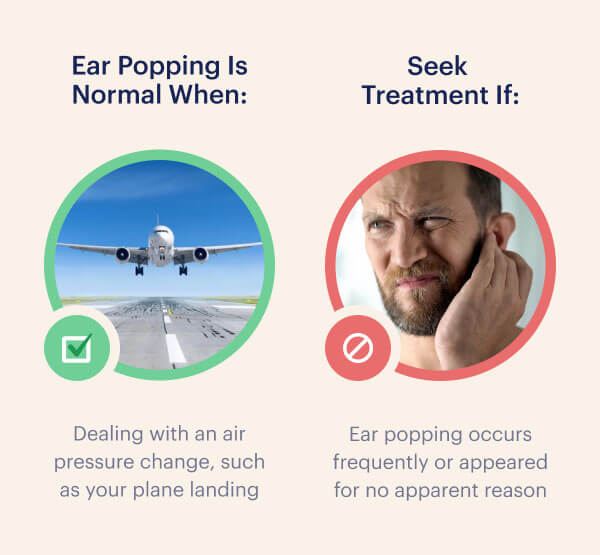
When dealing with an air pressure change, such as your plane landing, some crackling in your ear is normal. However, if it occurs frequently or appeared for no apparent reason, it’s best to see a doctor for the best treatment.
Diagnosis
Diagnosis depends on the cause. For example, acute otitis media or a buildup of earwax will involve the common ear examination with an otoscope. This is intended to check for any redness and swelling, or earwax or other objects in the ear canal. In the case of TMJ disorders, you may have jaw joint mobility and overbite measured with specialized tests.
Whether tinnitus (which includes the crackling noise you may be experiencing) can be heard by your doctor is important in finding the cause, so they could listen through a stethoscope. Potentially serious causes, including Meniere’s disease and some triggers of myoclonus, may require MRI scanning to pinpoint their origin.
Treatment Options for Ear Popping and Crackling
Treatment options for crackling ears depend on the cause and its severity:
- Avoiding cotton swab use and switching them for ear drops can assist in earwax buildup.
- Middle ear infections may not require treatment if they self-resolve within three to five days. However, antibiotics, over-the-counter pain relief, and even surgery to place ear tubes can be employed later. Such placement is usually if the infection is recurrent.
- Temporomandibular disorders may benefit from muscle relaxants, or exercises to promote correct functioning. Some people use a bite guard to “train” the muscles and bone structure, too.
- Meniere’s disease requires prompt treatment to prevent the need for surgery, which generally leads to permanent hearing loss. Use of corticosteroids may help to reduce fluid buildup.
Home Remedies for Ear Crackling
Home remedies for ear popping sounds include:
- By far the simplest remedy for crackling in the ear is the Valsalva maneuver. Simply pinch your nose, and try to breathe out through your nose. The pressure will seem to fill up your ears, and take the original offending pressure out with it when you swallow.
- Use irrigation to clear out earwax, instead of using a cotton swab.
- If seasonal allergies are getting you down, taking a decongestant or avoiding the allergen where possible may help reduce pressure, fluid buildup, and the risk of infection traveling up mucus.
- Exercises to provide relief for TMJ muscle disorders will be prescribed by your treating doctor or physiotherapist.
Ear Popping Prevention Tips
To prevent crackling and popping in your ears, you can try these tips:
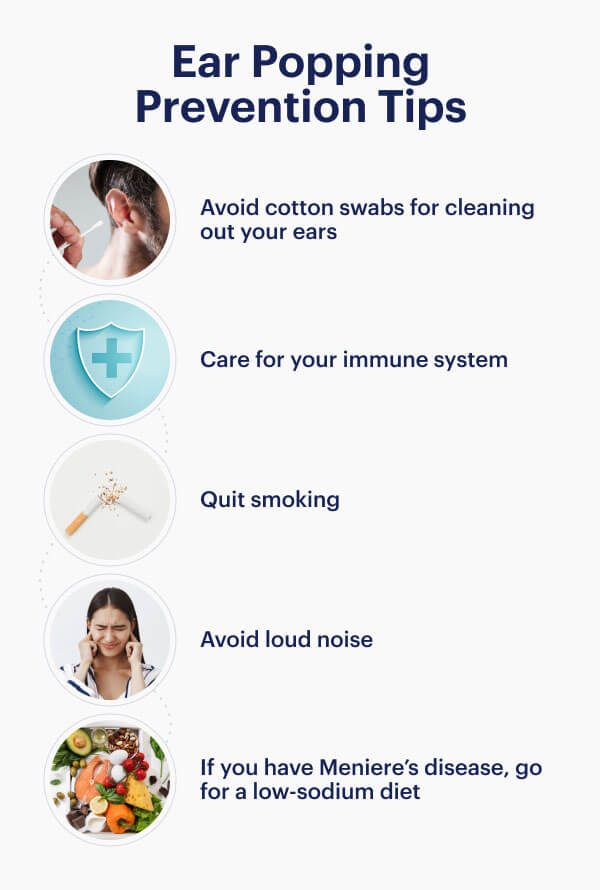
- Avoid cotton swabs for cleaning out your ears.
- Care for your immune system through a healthy diet and stress management to help prevent infection [3].
- Quit smoking to further benefit your immunity.
- Avoid loud noise, and wear protection if you cannot avoid them.
- If you have Meniere’s disease, a low-sodium diet may help prevent disease attacks.
FAQ
What are the most important things we need to know about popping in the ears?
What Does It Mean When You Hear Crackling and Popping in Your Ear?
Crackling ears may involve a blockage in the outer ear or Eustachian tubes, muscle disorders in the middle ear, or neural issues in the inner ear. There is an overarching “theme” of ear fullness and inappropriate muscle twitching.
Is It Bad If Your Ear Clicks?
If you’ve very recently traveled by air or spent time on a mountain, there is most likely no reason to worry about crackling ears. The most common causes, including ear wax buildup, ear infections, or mild Eustachian tube dysfunction from seasonal allergies, aren’t much to worry about.
Can Covid 19 Affect Your Ears?
It is possible for a COVID-19 infection to cause hearing loss and tinnitus, even if you only have mild symptoms. The disease itself may damage the inner ear, or lowered immunity may allow another infection to enter the Eustachian tubes and cause another illness [7].
What Helps Your Ears From Popping?
Regulation of the pressure inside your ears keeps them from popping. The Valsalva maneuver, where one tries to breathe out while pinching their nose, releases this pressure when the person swallows.
How Do I Get Rid of Clicky Ears?
If the crackling in your ear doesn’t self-resolve in a few days, you must identify the cause to get rid of the symptom. This could be earwax buildup, infection, disordered muscle contraction, or fluid buildup in the middle or inner ear.
Conclusion
Crackling or popping sounds in your ears are unlikely to be serious. Acute infections, such as otitis media or those that cause blocked Eustachian tubes, are more likely than a risky neurological issue. With the right treatment, you have far less to worry about too, as you can prevent long-term damage from causes including unresolved infections or obstructions.
References:
- Schilder, A G M et al. “Eustachian tube dysfunction: consensus statement on definition, types, clinical presentation and diagnosis.” Clinical otolaryngology : official journal of ENT-UK ; official journal of Netherlands Society for Oto-Rhino-Laryngology & Cervico-Facial Surgery vol. 40,5 (2015): 407-11. doi:10.1111/coa.12475
- Horton, Garret A et al. “Cerumen Management: An Updated Clinical Review and Evidence-Based Approach for Primary Care Physicians.” Journal of primary care & community health vol. 11 (2020): 2150132720904181. doi:10.1177/2150132720904181
- Schilder, Anne G M et al. “Otitis media.” Nature reviews. Disease primers vol. 2,1 16063. 8 Sep. 2016, doi:10.1038/nrdp.2016.63
- Ellenstein, Aviva et al. “Middle ear myoclonus: two informative cases and a systematic discussion of myogenic tinnitus.” Tremor and other hyperkinetic movements (New York, N.Y.) vol. 3 tre-03-103-3713-1. 15 Apr. 2013, doi:10.7916/D8RX9BS1
- Małgorzata, Pihut et al. “Diagnostic of Temporomandibular Disorders and Other Facial Pain Conditions-Narrative Review and Personal Experience.” Medicina (Kaunas, Lithuania) vol. 56,9 472. 15 Sep. 2020, doi:10.3390/medicina56090472
- Koenen L, Andaloro C. Meniere Disease. [Updated 2021 Sep 4]. In: StatPearls [Internet]. Treasure Island (FL): StatPearls Publishing; 2021 Jan-. Available from: https://www.ncbi.nlm.nih.gov/books/NBK536955/
- Chirakkal, Pramod et al. “COVID-19 and Tinnitus.” Ear, nose, & throat journal vol. 100,2_suppl (2021): 160S-162S. doi:10.1177/0145561320974849

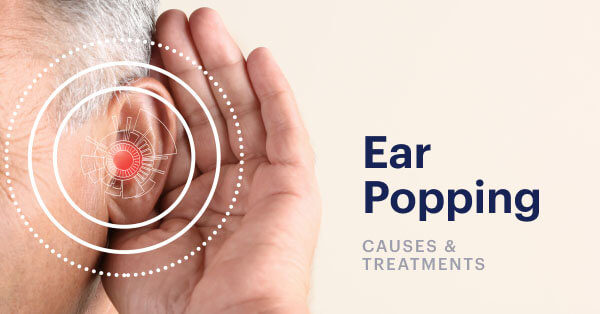




Leave a Reply